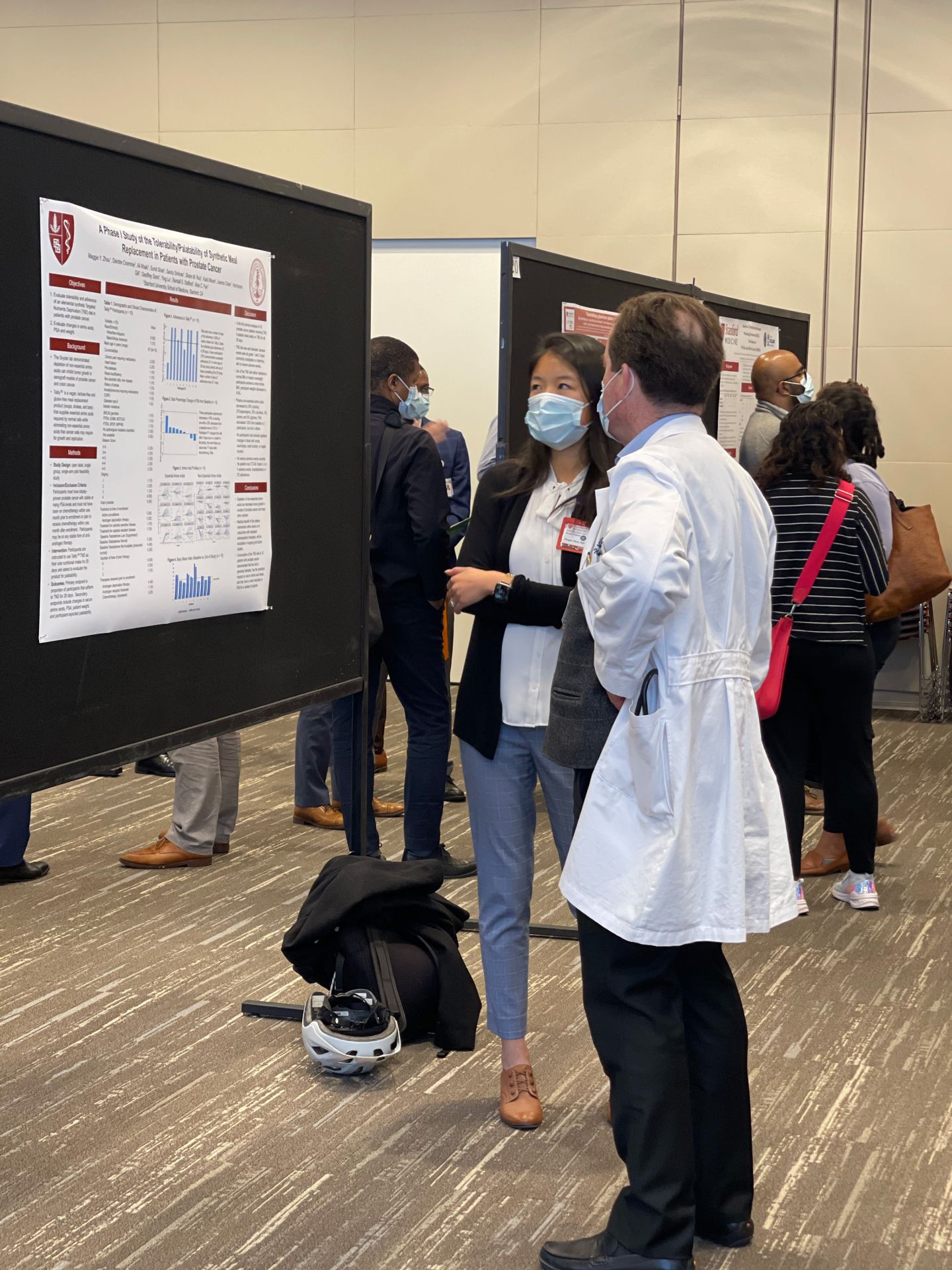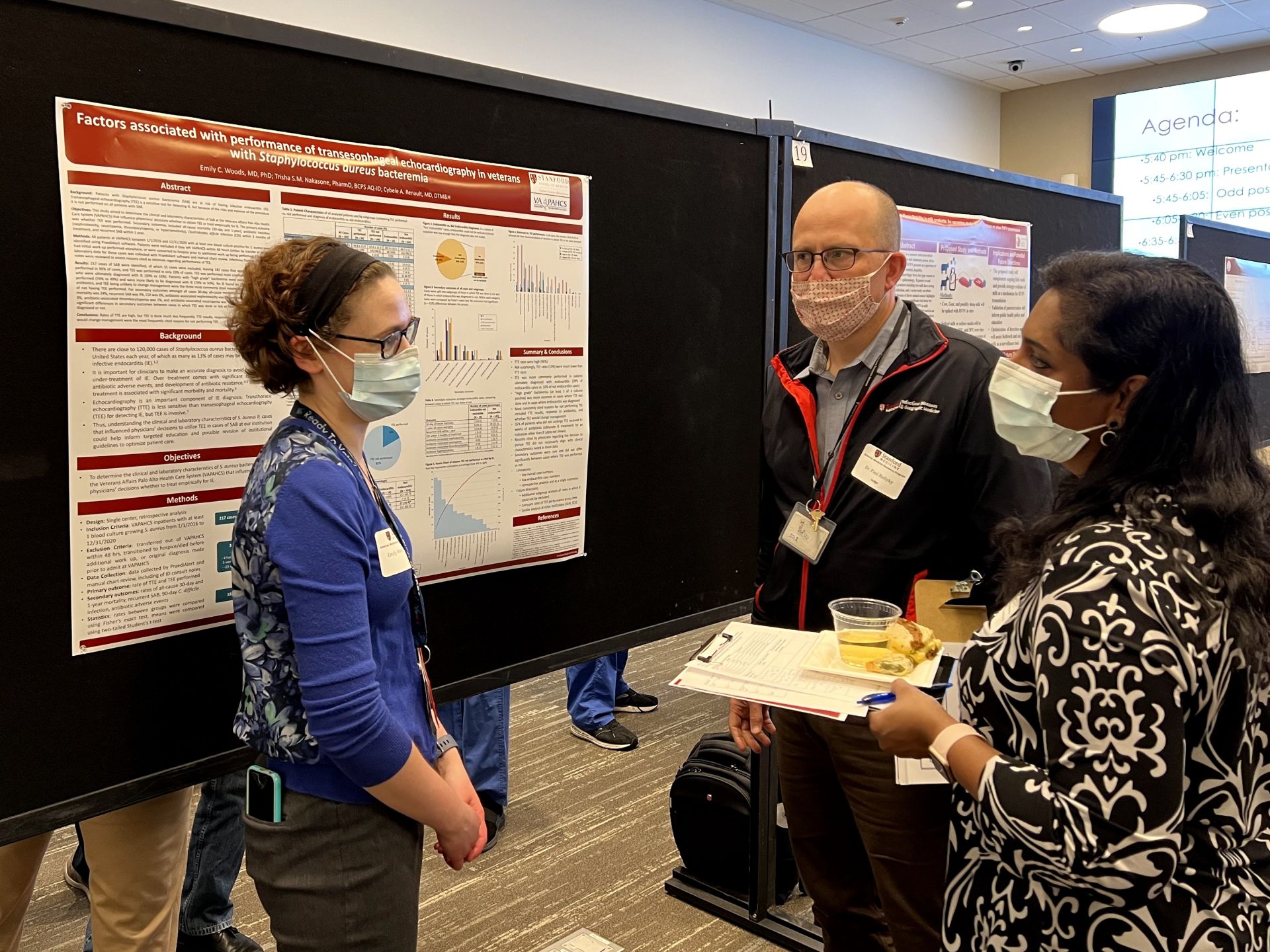Symposium Showcases Residents’ Valuable Research
Mentors and winners of prizes for their exceptional research. From left: Angela Rogers, MD; Matthew Alkaitis, MD, D.Phil; Ankita Devareddy, MD; Alfonso Molina, MD, MPH; Evan Baum, MD; Max McClure, MD; Sharif Vakili, MD, MBA; Ron Witteles, MD; Christian O’Donnell, MD.

Mentors and winners of prizes for their exceptional research. From left: Angela Rogers, MD; Matthew Alkaitis, MD, D.Phil; Ankita Devareddy, MD; Alfonso Molina, MD, MPH; Evan Baum, MD; Max McClure, MD; Sharif Vakili, MD, MBA; Ron Witteles, MD; Christian O’Donnell, MD.
Symposium Showcases Residents’ Valuable Research
Lorem ipsum dolor sit amet, consectetur adipiscing elit. Duis sit amet lobortis sem. Fusce vitae eros eget nulla sagittis dictum ac eu odio. Donec pellentesque neque vitae dolor vestibulum aliquet. Curabitur ullamcorper blandit tristique. Nam vitae lacus id orci porta fringilla sagittis eget lacus. Ut feugiat dolor at eros volutpat, et fermentum erat vestibulum. Maecenas quis semper nisi, sed hendrerit diam. Fusce sed gravida tortor. Aenean posuere eu leo nec vulputate. Nulla facilisi. Pellentesque habitant morbi tristique senectus et netus et malesuada fames ac turpis egestas. Morbi non velit imperdiet ante imperdiet ultricies.
Suspendisse ultricies sem in egestas fermentum. Etiam ac scelerisque erat, et malesuada lorem. Quisque fringilla justo ex, aliquam dapibus nibh luctus a. Nulla imperdiet, quam et tempor rhoncus, libero massa pharetra mi, ac volutpat risus orci vitae eros. Nulla eu feugiat arcu. Sed auctor non nisl nec pellentesque. Quisque semper, elit non tincidunt sollicitudin, felis nulla malesuada nunc, ac commodo erat nisl ut odio.
Each spring, residents, faculty, fellows, and medical students from across Stanford Medicine gather in a large conference room filled with several aisles of poster boards. The sounds of overlapping conversations emanate into the hallway as residents showcase abstracts of their scholarly works and research to their colleagues.
The occasion is the internal medicine Resident Research Symposium, which has been held every spring since 2018 and is part of a larger resident research program. Under the mentorship of leaders in their respective fields, residents participate in a diverse array of research projects, which are then presented at the symposium and even national conferences. Residents can also go on to publish their work in top-tier scientific journals.
For those looking to become physician-scientists or pursue a career in academia, this opportunity is invaluable.
“There is not a lot of time for science in residency, so this program offers the space for residents to work on their more scientific interests,” says Stefano Testa, MD, a third-year resident in categorical internal medicine who presented an abstract at the 2022 symposium on radioembolization, a type of radiation therapy used to treat liver cancer.
Conducting research on top of clinical duties, however, is a lot of work, Testa says, so the symposium offers a great space for residents to celebrate their accomplishments together.

“..from the energy and excitement in the room, it was clear that the 2022 symposium was about more than just the awards.”
Maggie Zhou, MD, discusses her research project.

Faculty judges, mentors, and other residents review a resident’s work.
ethnicity, and socioeconomic status are critical in determining a myelodysplastic patient’s overall clinical outcome.
At the end of the 2022 event, the faculty judges picked seven winners to receive $500 for their exceptional research. Winners were Baum; Molina; Sharif Vakili, MD; Max McClure, MD; Ankita Devareddy, MD; Christian O’Donnell, MD; and Matthew Alkaitis, MD, PhD. They were mentored by Andre Kumar, MD; Peter Greenberg, MD; Kevin Schulman, MD; Desiree LaBeaud, MD; Matthew Wheeler, MD, PhD; Angela Rogers, MD; and Tian Zhan, MD, PhD, and David Kurtz, MD, PhD, respectively.
As part of the program, residents are also assigned to faculty mentors, who help them throughout their research process. To acknowledge the mentors’ valuable work, an award was created for a “faculty member who has consistently gone above and beyond in providing support and mentorship for residents pursuing research.” In 2022, judges presented the Internal Medicine Residency Research Award for Outstanding Mentorship to Fatima Rodriguez, MD, an assistant professor in cardiovascular medicine.
Publishing data is important, and presenting data at symposiums like this one is a great start… It’s a starting point for something bigger, like a national conference meeting or a peer-reviewed publication.
– Stefano Testa, MD
Publishing data is important, and presenting data at symposiums like this one is a great start… It’s a starting point for something bigger, like a national conference meeting or a peer-reviewed publication.
– Stefano Testa, MD
Yet from the energy and excitement in the room, it was clear that the 2022 symposium was about more than just the awards. “I particularly enjoyed digging into the details of the work my colleagues have been doing,” says Alkaitis, who presented a poster on the analysis of DNA fragments that are circulating in the blood of patients with acute myeloid leukemia (AML). By finding a way to accurately measure this DNA, doctors can see whether AML patients have any cancer cells remaining in their body following treatment — without the need for a bone marrow biopsy.
“I have talked with several of my co-residents about their research in the past, but it was great to see the final figures and get to ask questions about how their work was unfolding,” he says.
A Month of Dedicated Research
The symposium isn’t all that is offered in the resident research program. Residents in their second and third years also can apply for one month of elective time dedicated solely to research. Over the years, more than 75% of residents have pursued this opportunity.
This year, Testa was one of the residents selected as part of this group, where he worked closely with his primary research mentors, including Kristen Ganjoo, MD, an associate professor of medicine who specializes in sarcomas — an uncommon group of cancers that arise in the bones and connective tissue.
“The month is very helpful, as you have time away from your clinical duties to focus only on your research,” says Testa. “I spent a lot of the month analyzing data, which made it easier to pull together the abstract, poster, and eventual manuscript when I was away from my rotations.”

Emily Woods, MD, PhD, answers questions about her research.
Testa has been involved in research on sarcomas since he was an intern, and over the years he has helped publish six research papers, with two more in the works. This year, he applied for a hematology/oncology fellowship at Stanford. His long-term goal is to develop a career in academic medicine as a physician-scientist with a special focus on immuno-oncology.
Testa sees the symposium, mentorship, and month of dedicated research as providing vital career and research opportunities to a growing number of internal medicine residents.
“Publishing data is important, and presenting data at symposiums like this one is a great start,” he says. “It’s a starting point for something bigger, like a national conference meeting or a peer-reviewed publication.”
